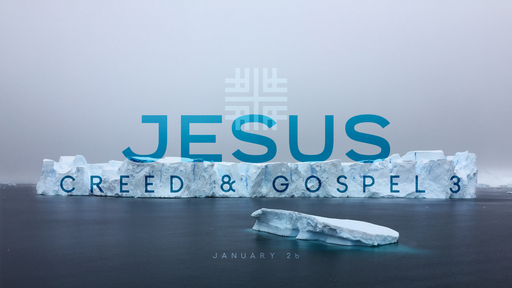January 26, 2020 - JESUS, Creed & Gospel 3
Notes
Transcript
The smaller groups in our church community are inside our homes where we go deeper,
build friendships, and walk out the Christian life with each other.
HOME CHURCH GUIDE
+ “Breaking the Ice” question (group facilitator)
+ CHECK-INS: Introduce, check-in
+ CARE: Needs in the group
+ COMPASSION: What is the group planning? Are you inviting your neighbours to join in?
+ GROUP ANNOUNCEMENTS Church-wide, group-only
+ DIG IN: Discuss questions as a group
+ END AND HOMEWORK: Final questions, prayer huddles for personal requests. Consider
breaking into small groups (huddles) of 2-4, by gender, if large enough.
Warm-up questions:
•
•
What are some of the (non-faith) rituals you already do daily? Think of your morning
routine, for example... [Wiki: A ritual is a sequence of activities involving gestures,
words, and objects, performed in a sequestered place and according to set sequence.
[1] Rituals may be prescribed by the traditions of a community, including a religious
community. Rituals are characterized, but not defined, by formalism, traditionalism,
invariance, rule-governance, sacral symbolism, and performance.[2]]
If you don’t do this repeated action sometimes for whatever reason, what does it do to
you mentally, emotionally, physically for you? (Your morning routine while travelling,
for example...)
The Right Tools
There are different tools for different jobs in life. Tools can be literal objects or skills for doing, and all doing has a thought process behind it. To use a tool efficiently, you practice, even
master or memorize it. The focus of this is not the tool, but the goal of adjusting or fixing
another object or situation. The right tool matters and makes a job easier. Certain phrases
and prayers are "tools" that allow us to focus on the 'job' of relationship. If a relationship
with Jesus is difficult, perhaps you're using the wrong tool...
This Sunday we explore simple tools you must use daily to keep Jesus and His story at your
centre.
KEY TEXTS: 1 Corinthians 1:10-18, Deuteronomy 6:4-9, Leviticus 19:18, Mark 12:28-29
THE STORY OF JESUS - BRINGS THE FULLNESS TO THE STORY OF ISRAEL
DISCUSSION questions:
+ Last week’s questions focused on learning the gospel story which the Holy Spirit used in
ancient preaching to draw people towards following Jesus (What must I do to be saved? Acts
16.3). This week we look at more practices to be shaped by the story of/life of Jesus.
• Key Texts
• Read the “Jesus Creed” (insert card) together. Share immediate thoughts and feelings
that might arise. What is happening when you do this?
• Do the same thing with the Jesus Prayer (but repeat it three times). Same reaction
questions...
• Talk about how calendars shape your experiences of life? For example New Year (western/business calendar), Lunar New Year, Church Calendar, Birthdays, Anniversaries.
What do these ways of “marking time” do to us/you and for us?
• We need practices that give us “push-back” against the anti-gospel stories of our culture(s). These are the stories the gospel comes against or seeks to redeem in some
way: individualism, consumerism, nationalism, scientism/naturalism, new age, postmodern tribalism (ethnic and ideological groupthink), salvation by therapy. How are
these stories shaping you or appeal to you? Where do they fail you? What does Jesus
say to these “hidden worldviews”?
• End the group discussion with a recitation of the Jesus Creed together (Reminder all of
this is voluntary, no pressure to participate!)
Prayer Requests:
TO CREATE A GOSPEL CULTURE (TKJG)
1. Become people _________________________________________________________________________
2. Immerse _________________________________________________________________________
•
____________________________________________________________________________________________________________________
•
The Church Calendar
• The whole year immerses us in readings and the life of Jesus
•
Advent, Christmas, Epiphany, After Epiphany, Lent, Great Three days (Maundy
Thursday, Good Friday, Easter vigil on Saturday, Easter, Pentecostal and Ordinary Time).
THE JESUS CREED
"Hear, O Israel, the Lord our God, the Lord is one.
Love the Lord your God with all your heart, with all your soul,
with all your mind, and with all your strength."
The second is this: "Love your neighbour as yourself."
There is no commandment greater than these.
Oord (17) "To love is to act intentionally, in sympathetic/empathetic response to God
and others, to promote overall well-being."
3. The Church’s Story
THE JESUS PRAYER FROM EASTERN ORTHODOX TRADITION
"Lord Jesus Christ, Son of God, have mercy on me, a sinner."
+ Read Justo Gonzalez's The Story of Christianity.
SUMMARY NEXT STEPS
• A commitment to _________________________________________________________________________
4. Counter-Stories
5. Personally Embrace the Story
SUPER SIMPLE TOOLS
THE CREED OF JESUS AND THE TRANSFORMING MEDITATION
• Changing your focus through intentional patterns will also change your desire and
hunger to grow.
• Set your mind and imagination on Jesus.
•
A commitment to naming _________________________________ and developing counter-stories
•
A commitment to the tools _________________________________________________________________________
• Jesus Creed
•
Jesus Prayer
•
Nicene Creed
GO DEEPER ON YOUR OWN
• The Bible Project interview/podcast with Scott McKnight:
https://thebibleproject.com/podcast/jesus-creed/
• Read the Book: The Jesus Creed and/or The King Jesus Gospel - Scott McKnight
• Scot's podcast, Kingdom Roots:
https://podcasts.apple.com/us/podcast/kingdom-roots-with-scot-mcknight/id1078739516
• Scott’s Blog: https://www.christianitytoday.com/scot-mcknight/
Sources: Bible; The King Jesus Gospel, Scott McKnight; The Day the Revolution Began, NT Wright; Jesus and the Eyewitness, Richar
Bauckham; Conflict and Community in Corinth, Ben Witherington III; Others.
